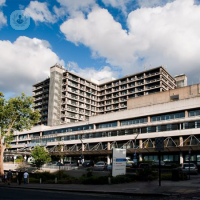Ascites
Professor Kevin Peter Moore - Hepatology (liver specialist)
Created on: 03-01-2017
Edited by: Lauren Dempsey
Index:
- What is ascites?
- What are the types of ascites?
- What causes ascites?
- Who is at risk of developing ascites?
- What are the symptoms of ascites?
- Which specialist treats ascites?
- How is ascites diagnosed?
- How is ascites treated?
- Can ascites be prevented?
- What is the prognosis?
- What are potential complications of ascites?
- How can ascites be controlled?
What is ascites?
Ascites is the abnormal accumulation of fluid in the space between the lining of the abdomen and the abdominal organs, known as the peritoneum.

What are the types of ascites?
Previously, ascites was classified into transudative or exudative based on the amount of protein that was in the fluid build-up. Now, the condition is classified by the Serum Ascites Albumin Gradient (SAAG) comparing the amounts of the protein albumin in the fluid to the amount in the blood which can determine the underlying cause of ascites.
What causes ascites?
Ascites is caused by high pressure in the liver's blood vessels, also known as portal hypertension, and low levels albumin. Diseases that cause severe liver damage and scarring (cirrhosis) can also lead to the development of ascites. These would include prolonged infection with hepatitis C or B, excessive alcohol consumption over a long period, and fatty liver.
Who is at risk of developing ascites?
Ascites is usually a symptom of another illness and is most commonly associated with advanced liver disease. Other risk factors for contracting ascites would be some types of cancer in the abdomen, such as cancer of the appendix, colon, ovary, uterus, pancreas, and liver. Furthermore, conditions such as clots in the liver veins or thrombosis of the portal vein, congestive heart failure, and pancreatitis can also cause ascites, as can kidney dialysis.
What are the symptoms of ascites?
The main symptom of ascites is abdominal distension, which patients may notice when clothing becomes tighter, or their belt size increases. In cases where the ascites is advanced, the patient may describe a feeling of heaviness in their abdomen. If the patient also gains weight, they may experience issues with mobility.
Other symptoms of ascites may include:
- Abdominal pain
- Bloating
- Constipation
- Loss of appetite
- Indigestion
- Nausea and vomiting
- Heartburn
- Hernia
- Shortness of breath
- Swollen ankles
Symptoms of other illnesses, such as liver failure, may also be present. In cases where the pathology is more serious, symptoms such as peritonitis, weight loss, and malnutrition, mental confusion, bleeding in the upper or lower intestines may be present.
Which specialist treats ascites?
The specialists who will diagnose and subsequently treat a patient with ascites would be hepatologists and gastroenterologists. Other specialists may also treat patients depending on their underlying condition.
How is ascites diagnosed?
The specialist will first perform a physical exam to determine the extent of swelling in the abdomen. Other tests may also be used to assess the condition of the liver and kidneys. Among them are:
- Assess electrolyte levels
- Kidney function tests
- Liver function tests
- Tests to measure the risk of bleeding and protein levels in the blood
- Urine analysis
- Abdominal ultrasound
The specialist may also consider it appropriate to remove a small amount of the fluid produced by the ascites to analyse it.
How is ascites treated?
To treat ascites, the specialist will proceed to treat the underlying cause. First, they will recommend a change in lifestyle, avoiding alcohol, reducing salt intake, and reducing fluid intake. Some medications such as diuretics may also be used to remove excess fluid and antibiotics for infections.
In some cases, where the above methods have not worked, a procedure called paracentesis will be offered, which uses a needle inserted into the abdomen to remove large amounts of fluid. This procedure is also known as an ascitic drain.
Patients suffering from terminal liver disease may require a liver transplant.
Can ascites be prevented?
Prevention of ascites involves trying to avoid some of its risk factors such as reducing or stopping alcohol consumption and decreasing salt intake.
What is the prognosis?
Ascites can respond well to treatment, however, usually, it is the underlying cause of the ascites that is more concerning and requires treatment. The success of treatment really depends on the underlying condition’s response to treatment.
What are the potential complications of ascites?
If ascites is not treated, it can result in bleeding in the lower intestine, kidney failure, and other complications associated with liver damage.
How can ascites be controlled?
Ascites can be managed by reducing salt intake and taking a diuretic, or water pills. Nutritionists can offer advice on diets with low sodium.







